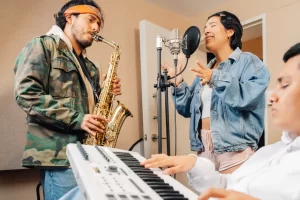Pursuing a full-time career in music is a dream for many passionate musicians. Turning your love for music into a sustainable livelihood can be incredibly rewarding, but it also comes with its own set of challenges. The music industry is competitive, and making a name for yourself requires dedication, hard work, and strategic planning. However, with the right approach, turning your passion for music into a full-time career is entirely achievable.
This blog post aims to provide actionable steps and insights for aspiring musicians who are ready to take the leap. We’ll explore various aspects of building a successful music career, from setting clear goals and continuously improving your skills to creating a professional portfolio and effectively marketing your music. Networking, financial planning, and staying motivated are also crucial components that we will delve into.
Understanding the multifaceted nature of the music industry and preparing yourself for the journey ahead can make the difference between simply dreaming and actually living your dream. By following the strategies outlined in this guide, you’ll be better equipped to navigate the path to becoming a full-time musician, ensuring that your passion for music translates into a fulfilling and sustainable career. So, let’s dive in and start turning your musical dreams into reality.
Setting Clear Goals and Expectations
Setting clear goals and expectations is the foundation of any successful music career. It begins with defining what you want to achieve, both in the short term and long term. Short-term goals might include recording a demo, building an online presence, or booking your first gig, while long-term goals could involve releasing an album, going on tour, or signing with a record label. Having specific, measurable objectives gives you a roadmap to follow and helps keep you focused and motivated.
Understanding the music industry is also crucial when setting your expectations. The path to success is rarely straightforward, and it often requires more time and effort than initially anticipated. Research the different career paths within the industry, from performing and recording to producing and songwriting. Recognizing that each path has its own set of challenges and rewards will help you make informed decisions about where to focus your efforts.
It’s important to be realistic about the time and dedication required to make it in the music industry. Many successful musicians have spent years honing their craft, networking, and promoting their work before achieving significant recognition. Patience and perseverance are key. Accept that there will be setbacks and obstacles along the way, but view them as opportunities to learn and grow rather than insurmountable barriers.
By setting clear goals and maintaining realistic expectations, you create a solid foundation for your music career. This approach not only helps you stay organized and on track but also ensures that you are prepared for the ups and downs of the industry, ultimately increasing your chances of long-term success.
Building Your Skills and Knowledge
Building your skills and knowledge is a continuous journey that plays a critical role in turning your music passion into a full-time career. To stand out in the competitive music industry, it’s essential to constantly improve your musical abilities. This means practicing your instrument regularly, honing your vocal techniques, and expanding your repertoire. Taking lessons from experienced musicians, either in-person or online, can provide valuable insights and accelerate your growth.
Beyond your primary musical skills, developing additional competencies can significantly enhance your career prospects. Learning music production allows you to create high-quality recordings independently, giving you more control over your sound and reducing reliance on external studios. Familiarizing yourself with digital audio workstations (DAWs) and other music production tools can open up new creative possibilities and make your music more marketable.
Understanding the business side of the industry is equally important. Educate yourself on topics such as music marketing, distribution, and legal aspects like copyright and royalties. Online courses, workshops, and industry seminars can provide practical knowledge that will help you navigate the complexities of the music business more effectively.
Networking and staying updated with industry trends are also vital. Attend music conferences, join professional associations, and engage with online communities to exchange ideas and learn from others’ experiences. This not only broadens your knowledge but also helps you build a supportive network that can offer opportunities and guidance.
By committing to lifelong learning and skill development, you position yourself for sustained success in the music industry. The more versatile and knowledgeable you become, the better equipped you are to adapt to changes and seize new opportunities as they arise.
Creating a Professional Portfolio
Creating a professional portfolio is essential for showcasing your talent and making a strong impression on industry professionals. Your portfolio serves as your musical resume, demonstrating your skills, style, and achievements. Start with high-quality recordings of your music. Whether you produce these at home or in a professional studio, ensure that they highlight your best work. Clear, well-mixed tracks are crucial for catching the attention of potential collaborators, managers, and labels.
Visual elements are also important in your portfolio. Invest in professional photos that capture your personality and stage presence. These images will be used across your social media profiles, website, and promotional materials, so they should reflect your brand accurately. Consider including video recordings of live performances, as they provide a dynamic representation of your stage presence and ability to engage an audience.
An up-to-date, user-friendly website is a cornerstone of your professional portfolio. Your website should feature your music, biography, high-quality photos, videos, and a press kit. Make it easy for industry professionals and fans to find information about you, listen to your music, and contact you. Including a blog or news section can also keep your audience engaged with updates about your projects and performances.
Utilize streaming platforms like Spotify, Apple Music, and YouTube to distribute your music and reach a broader audience. Ensure your profiles on these platforms are complete and professional, with links to your website and social media. This cohesive online presence reinforces your brand and makes it easy for people to explore your work.
By compiling a comprehensive and polished portfolio, you create a compelling presentation of your artistry that can open doors and attract the opportunities needed to transition to a full-time music career.
Networking and Building Relationships
Networking and building relationships are fundamental to advancing your music career. Engaging with the music community, both locally and online, can lead to valuable opportunities and collaborations. Start by attending local gigs, open mics, and music festivals. These events provide a platform to meet fellow musicians, industry professionals, and potential fans. Engage in conversations, share your passion, and be open to learning from others’ experiences.
Connecting with industry professionals, such as producers, managers, and booking agents, is crucial. Attend industry events, workshops, and seminars where you can meet these key players. Be prepared with a concise pitch about who you are and what you do, and have your portfolio ready to share. Networking isn’t just about what others can do for you, but also about what you can offer in return. Show genuine interest in others’ work and be willing to collaborate and support their projects.
Collaborating with other musicians can significantly broaden your reach and enhance your creative output. Joint projects, such as co-writing songs or performing together, can introduce you to new audiences and provide fresh perspectives on your work. Online platforms and social media are excellent tools for networking beyond your local scene. Engage with other artists and industry professionals on platforms like LinkedIn, Instagram, and Twitter to build a wider network.
Maintaining these relationships is just as important as establishing them. Follow up after initial meetings, stay in touch regularly, and show appreciation for any support or opportunities you receive. By investing time and effort into networking and building relationships, you create a supportive community that can help you navigate the music industry and achieve your career goals.
Financial Planning and Stability
Financial planning and stability are critical aspects of turning your music passion into a full-time career. As an independent musician, managing your finances effectively can mean the difference between sustaining your career and facing financial difficulties. Start by creating a detailed budget that accounts for all your income and expenses. Track your earnings from various sources such as live performances, merchandise sales, streaming royalties, and teaching music lessons. Understanding where your money comes from and where it goes helps you make informed financial decisions.
Diversifying your income streams is essential for financial stability. Relying solely on one source, like gigging, can be risky. Explore other avenues such as licensing your music for TV, films, and commercials, or offering online music courses. Merchandise, such as T-shirts, posters, and vinyl records, can also provide a significant revenue boost. By having multiple income streams, you can better withstand fluctuations in the music industry.
Setting aside savings for unexpected expenses and future investments is crucial. Building an emergency fund ensures you have a financial cushion in times of need. Additionally, consider investing in your career by saving for better equipment, marketing efforts, or professional development opportunities.
Managing your expenses carefully is equally important. Look for ways to reduce costs without compromising the quality of your work. For example, recording at home using affordable equipment or collaborating with other artists on projects can save money while still producing high-quality results.
By maintaining a disciplined approach to financial planning and stability, you can focus more on your music and less on financial stress. This foundation not only supports your day-to-day activities but also provides the resources needed to seize new opportunities and grow your career over the long term.
Marketing and Promoting Your Music
Marketing and promoting your music are essential steps in transforming your passion into a full-time career. Effective marketing helps you reach a wider audience, build a loyal fanbase, and increase your visibility in a crowded industry. Start by developing a solid marketing strategy that outlines your goals, target audience, and the channels you will use to reach them. This plan will guide your promotional efforts and ensure consistency in your messaging.
Utilizing social media platforms is a powerful way to connect with fans and promote your music. Platforms like Instagram, Facebook, TikTok, and Twitter allow you to share updates, behind-the-scenes content, and new releases directly with your audience. Engage with your followers by responding to comments, hosting live sessions, and creating interactive content such as polls and Q&A sessions. Consistency and authenticity in your posts will help build a strong online presence and deepen your connection with fans.
Email marketing is another effective tool for promotion. Building an email list of fans allows you to send personalized updates about upcoming shows, new releases, and exclusive content. Regular newsletters keep your audience informed and engaged, fostering a sense of community around your music.
Collaborating with bloggers, influencers, and music websites can also amplify your promotional efforts. Reach out to industry contacts for features, reviews, and interviews. These collaborations can introduce your music to new audiences and enhance your credibility.
Investing in digital advertising can further boost your reach. Platforms like Facebook Ads and Google Ads allow you to target specific demographics and promote your music to potential fans. By strategically marketing and promoting your music, you can build a strong fanbase, increase your visibility, and create a sustainable career in the music industry.
Staying Motivated and Persistent
Staying motivated and persistent is crucial for success in the music industry, where challenges and setbacks are inevitable. The journey to becoming a full-time musician requires resilience and a positive mindset. One way to maintain motivation is by setting regular milestones and celebrating small victories. Breaking down your long-term goals into achievable steps can make the process feel more manageable and rewarding. Each milestone reached is a testament to your progress and dedication.
It’s also important to find inspiration in your everyday life. Surround yourself with music and creativity. Listen to a variety of artists, attend live performances, and engage with other musicians. This constant exposure can spark new ideas and keep your passion alive. Additionally, maintaining a healthy work-life balance is essential. Take breaks when needed, and ensure you have time for activities that rejuvenate you outside of music.
Dealing with rejection and setbacks is part of the journey. Use these experiences as learning opportunities rather than letting them discourage you. Reflect on feedback, adapt, and continue improving your craft. Remember that every successful musician has faced obstacles and persevered through them.
Building a support system can also help you stay motivated. Surround yourself with people who believe in your talent and encourage your efforts. Whether it’s family, friends, or fellow musicians, having a network of support can provide emotional strength and practical advice.
Lastly, keep reminding yourself why you started this journey in the first place. Your passion for music is your driving force. By staying focused on your goals, embracing the challenges, and celebrating your progress, you can maintain the motivation and persistence needed to turn your music passion into a full-time career.
To Sum It Up
To sum it up, turning your music passion into a full-time career requires a multifaceted approach involving goal setting, continuous skill development, professional networking, financial planning, and strategic marketing. It starts with setting clear goals and realistic expectations, understanding that the path to success is often long and filled with challenges. Building your skills and expanding your knowledge is a lifelong journey, and staying informed about industry trends and continuously improving your craft are essential.
Creating a professional portfolio showcases your talent and establishes your brand, making it easier for industry professionals and fans to connect with you. Networking and building relationships within the music community can open doors to new opportunities and collaborations that can propel your career forward. Financial stability and careful planning are crucial to sustain your career, allowing you to invest in your music and handle the inevitable ups and downs of the industry.
Effective marketing and promotion help you reach a broader audience and build a loyal fanbase, while staying motivated and persistent keeps you on track despite obstacles. Embracing every aspect of this journey with passion and dedication will help you navigate the complexities of the music industry and achieve your dreams. Remember, success in music is not just about talent; it’s about resilience, hard work, and a strategic approach to every aspect of your career. With the right mindset and tools, you can turn your passion for music into a rewarding full-time career.




